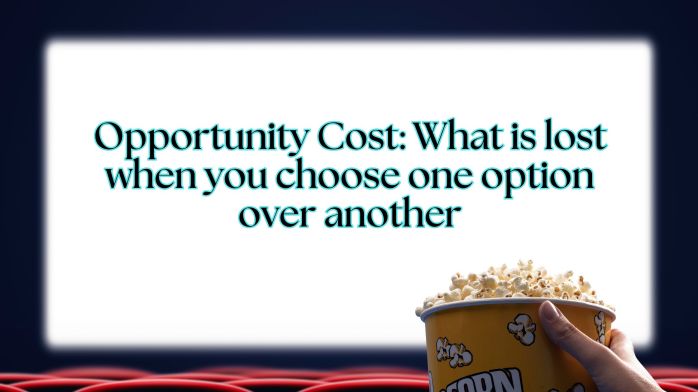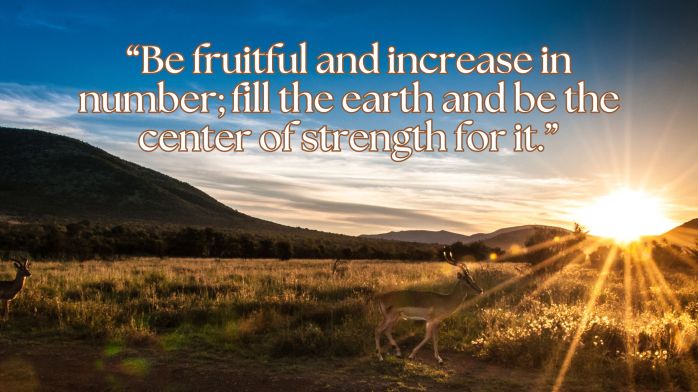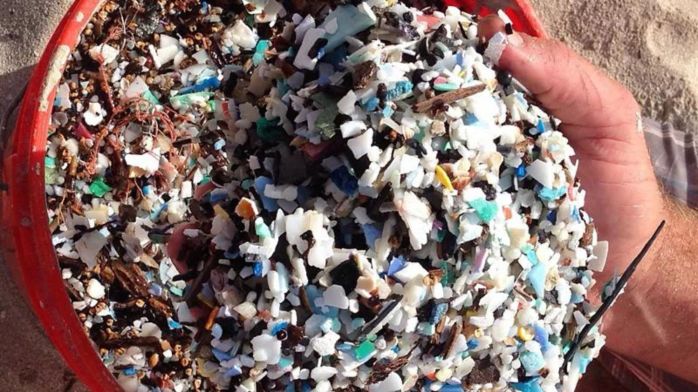They Pay People to Do That!

So God created mankind in his own image,
in the image of God he created them;
male and female he created them.
28 God blessed them and said to them, “Be fruitful and increase in number; fill the earth and subdue it. Rule over the fish in the sea and the birds in the sky and over every living creature that moves on the ground.” – Genesis 1:26-28
“They pay people to do that!“
I’m embarrassed to say those words came out of my mouth. But they did. I’ll ask you to forgive me. This was before I was a pastor, before I went to seminary, and before I was even baptized. Still, I should have known better. But I said those words and worse, I said them to my beautiful wife Cassie on our third date. Thankfully, she didn’t dump me. We had just gone to see Bridget Jones Diary and like any good date at the movies, I bought soda and popcorn to share. At the end of the show, I left them behind. Now, I didn’t dump them on the floor or anything. I left the soda in the cup holder and the popcorn on the floor, but Cassie came behind me and picked it up. I turned to her and said, “You don’t have to pick that up. They pay people do to that.” Again, lucky she didn’t dump me. Cassie just thought it was wrong to make other people do the work she could and should do herself. Sure, we pay people to do that, but think of the opportunity cost. Opportunity cost is what is lost when you choose one option over another. If the theater didn’t have to hire so many people to clean up after us, we would have quicker service at the concession stand. They might be able to invest in better technology. They might be able to upgrade their system to give you a better viewing experience. All because we pick up after ourselves instead of making other people do it for us. I have never left my trash behind in a theater ever since.
Our choices have long-term consequences.
Something we are learning about right now. And I don’t mean tomorrow or next week or next year. What we do today can have a lasting impact over time that affects the next generation and the next and the next. Our selfish actions now are hurting our children, grandchildren, and great-grandchildren. And that only makes me think about what God said to us in the Ten Commandments, that our sins carry over from generation to generation, but that our love does, too.[1] The choices we make decide what kind of impact we have not just on our own lives, but the lives of people long after we are gone. It’s all about choice. So what choices are you making today? Earlier we shared the companion passage to this one about God’s creation and how God has tasked us to take care of the Earth. God said, “Be fruitful and increase in number; fill the earth and subdue it. Rule over the fish in the sea and the birds in the sky and over every living creature that moves on the ground.” Some translations have “rule” as “have dominion over,” but both fall short of God’s expectations. Instead, some Biblical scholars have looked at the root meaning of the word “radah” and have determined we’ve misinterpreted it, and actually it means something similar to “center of strength.” [2]Can you imagine how we would view our role in the world if we saw it from THAT lens? If we read that passage as “Be fruitful and increase in number; fill the earth and be the center of strength for it.” How different our world would look. And we find that to be consistent with our passage this morning.
8 Now the Lord God had planted a garden in the east, in Eden; and there he put the man he had formed. 9 The Lord God made all kinds of trees grow out of the ground—trees that were pleasing to the eye and good for food. In the middle of the garden were the tree of life and the tree of the knowledge of good and evil.
10 A river watering the garden flowed from Eden; from there it was separated into four headwaters. 11 The name of the first is the Pishon; it winds through the entire land of Havilah, where there is gold. 12 (The gold of that land is good; aromatic resin[d] and onyx are also there.) 13 The name of the second river is the Gihon; it winds through the entire land of Cush.[e] 14 The name of the third river is the Tigris; it runs along the east side of Ashur. And the fourth river is the Euphrates.
15 The Lord God took the man and put him in the Garden of Eden to work it and take care of it. – Genesis 2:8-15
Human beings were entrusted by God with the care of creation.
In both readings of the story of creation, God puts humanity at the heart of it. In this passage, we find out that there is a river flowing through the Garden of Eden and God entrusts Adam to care for the Garden. This river then becomes four rivers which flow forth to nourish the known land: the Pishon, the Gihon, the Tigris and Euphrates, so this one river flowing through the Garden of Eden is the “center of strength” for all of creation and humanity is put in charge of caring for it. God makes it clear that creation care is our responsibility. But sadly, we are doing a poor job of it. In our consumer culture, fast fashion is not just a moral problem (forced and child labor) but is already a vast environmental problem as well. In order to invent new trends and keep up with fashion wants, the fast fashion industry pumps out as much as it can at affordable prices, and the way they do it is by employing cheap labor in countries with lax environmental protections and using inferior materials so they can get it to market cheaper and faster than their competitors. For you to buy these products at Zara, H&M, Forever 21, and Uniqlo (four of the biggest culprits of fast fashion[3]), all we have to do is sacrifice the earth. It’s estimated that every second a garbage truck of clothes is either dumped into a landfill or incinerated, which makes sense considering by 2015 we bought 60% more clothes than we did at the turn of the century, and we would throw them away in half the time.[4] But impacting our landfills and our air pollution isn’t the only byproduct. According to the United Nations, “nearly 95 trillion gallons of wastewater are produced every year – roughly the equivalent of 41 years of drinking water for the entire human population.”[5] Of that wastewater, 20% is produced by the fashion industry – “more than the aviation and shipping sectors combined.”[6] And 80% of that goes untreated and even less is recycled.[7] The dyeing process used to make your clothes is responsible for 17 to 20 percent of industrial water pollution.[8] As if that wasn’t enough, the fashion industry is also responsible for an estimated 35% of the microplastics that litter the ocean.[9] Those microplastics can cause harm in a variety of ways, both known and suspected.
You may have heard of the Great Pacific Garbage Patch.
It’s one of five areas in the world’s oceans where these plastics and microplastics gather. In 2018, it was estimated that the GPGP contains at least 79,000 tonnes of ocean plastic and covers an area nearly three times the size of the country of France![10] What is so insidious is that you can’t easily see it. Although we like to imagine a literal island of plastic garbage floating in the ocean, most of it doesn’t appear as anything but a “murky soup.”[11] The actual mass of it is largely composed of fishing nets and other ocean fishing equipment, but the majority of pieces (94%) are due to microplastics. Many of the negative effects of microplastics are still being studied, but one of the biggest concerns for humans is the ingestion of these microplastics through consumption of fish, oysters, sardines, and other marine life. We know consumption of microplastics can cause disease, disability and contribute to premature death, and because toxic chemicals bind easily to microplastics, it’s hypothesized that it can also lead to other diseases like cancer, can cause inflammation, damage to the colon and small intestine, and the immune system.[12] While it’s still being studied it’s hard not to believe that a bunch of plastic floating in the ocean caused by human waste won’t have a negative effect on us in multiple ways.
We simply have to do a better job of caring for our planet.
The choices we make have an impact. What we wear, what we eat, how we eat it – they all make an impact on the environment around us. We can and should make choices every day to make the world a better place. We will make mistakes and we won’t be perfect, but if all made an effort and did a little bit more, made things last a little bit longer, we could transform the world. Just look at what happened during the height of the pandemic. People stopped driving. People stopped producing massive amounts of goods. And fast fashion came to a standstill.[13] Clothing was the least of our concerns and factories all over the world slowed or stopped production. And the land started to heal. But now, we are right back to where we were and maybe we shouldn’t be. Maybe we could do things a different way. The opportunity cost of a throwaway culture is a damaged Earth. Let’s take the opportunity instead to invest more time to do things right. Recycle more. Throw away less. Make things last longer. And perhaps we can help to save our planet. After all, it’s exactly what God wants us to do.
[1] Derived from Exodus 20:5-6. In that passage, we have translated it as “punish” and “jealous” but what God is telling us is that our sins have consequences that go beyond just ourselves but affect those around us. Our love does too. And the positive consequences of our actions can ALSO be felt by future generations.
[2] http://www.christiantoday.com/article/dominion.over.the.earth.comes.with.responsibility.christians.learn/25635.htm http://www.unitingearthweb.org.au/explore/a-radical-new-look-at-dominion-in-genesis
[3] According to Earth.org these are just some of the fast fashion companies responsible for these effects: https://earth.org/fast-fashion-companies/
[4] https://www.unep.org/news-and-stories/story/environmental-costs-fast-fashion
[5] https://www.cnn.com/2023/04/21/middleeast/textile-wastewater-pollutant-cleaner-hnk-scn-spc-intl/index.html
[6] https://news.climate.columbia.edu/2021/06/10/why-fashion-needs-to-be-more-sustainable/
[7] https://www.cnn.com/2023/04/21/middleeast/textile-wastewater-pollutant-cleaner-hnk-scn-spc-intl/index.html
[8] https://news.climate.columbia.edu/2021/06/10/why-fashion-needs-to-be-more-sustainable/
[9] Ibid
[10] https://www.bbc.com/future/article/20240115-visualising-the-great-pacific-garbage-patch
[11] https://www.bbc.com/future/article/20240115-visualising-the-great-pacific-garbage-patch
[12] https://www.niehs.nih.gov/research/programs/geh/geh_newsletter/2023/8/articles/new_research_highlights_the_problem_of_microplastic_pollution
[13] https://news.climate.columbia.edu/2021/06/10/why-fashion-needs-to-be-more-sustainable/



